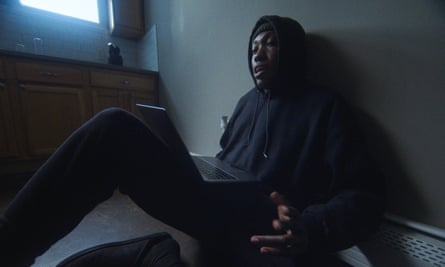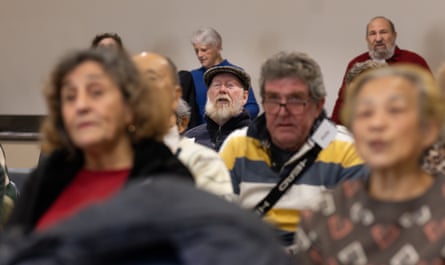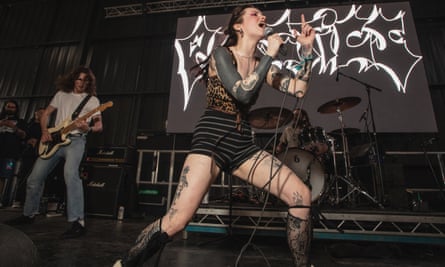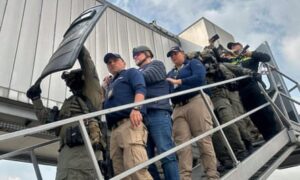I
In September 2001, McKinley Phipps Jr, also known as the rapper Mac, was given a 30-year prison sentence for manslaughter. The incident took place a year and a half earlier when gunshots were heard outside a club where he was scheduled to perform in Slidell, Louisiana. The shooting resulted in the death of 19-year-old Barron Victor Jr. Despite maintaining his innocence, Phipps, who was 22 at the time, was charged. However, the evidence against him was weak – there was no firearm linking him to the crime, multiple witnesses retracted their statements, and another individual confessed to being the shooter. Nevertheless, prosecutors had their strongest piece of evidence: Mac, a talented rap artist from New Orleans who had been producing music since the age of 13, had rapped about murder.
In the documentary “As We Speak: Rap Music on Trial,” Phipps is shown reciting the words “Murder, murder, kill, kill.” This phrase, along with lyrics from another song, “Pull the trigger, put a bullet in your head,” was used by prosecutors to portray Phipps as a killer. Despite lacking any physical evidence or confessions, an all-white jury convicted him based on this interpretation of his rap lyrics. Phipps was ultimately released from prison after serving over 21 years, when he was granted clemency in 2021.
Phipps is an example of over 700 instances where rap lyrics have been used in court to secure convictions. This controversial legal practice, as analyzed in As We Speak, stems from the criminalization of Black individuals in the United States. Many artists have always left an implicit gap between their lyrics and reality; for example, Romeo and Juliet is not taken as a personal account despite its convincing performance. The fascination with murder, especially from the perspective of the killers, has been present in various forms of entertainment such as westerns, mafia movies, and even popular television series with morally questionable protagonists. According to JM Harper, the director of the film, “we’ve always been obsessed with murder, and specifically from the side of people who kill.” However, when it comes to Black art and music, a switch seems to occur where it is no longer seen as entertainment or expression but rather as a confession and evidence in the courtroom. This double standard is absurd.
Many famous white musicians have written lyrics about murder, with popular examples including Freddie Mercury’s “Bohemian Rhapsody” and Johnny Cash’s “Folsom Prison Blues.” Even more recent artists such as The Chicks and Taylor Swift touch on the topic, portraying characters who commit murder as a form of retribution or protection. Despite the graphic nature of these songs, they are commonly viewed as fictional and do not pose any legal consequences.
However, when the artist and beat are altered, the lyrics can be manipulated to appear threatening. These lyrics have been used as evidence of gang involvement, as proof of criminal intent, or to portray a rapper as “violent”. This practice has occurred in the past with artists like Snoop Dogg in the 1990s, Drakeo the Ruler in 2018, Tekashi 6ix9ine in 2019, and Young Thug in 2023. The issue at hand is deeply intertwined with race. The documentary “As We Spea
The film As We Speak draws inspiration from Dennis and Nielson’s academic text Rap on Trial, but takes the form of a road movie. Rapper Kemba, who hails from the Bronx, embarks on a journey to various rap hubs, meeting with individuals whose lives have been affected by their involvement in the genre. Along the way, he symbolically descends through a flawed criminal justice system that encourages prosecutorial misconduct and flawed convictions, as well as unfair plea deals. The film is a unique combination of historical information, personal accounts, and speculations – presenting a fictitious yet powerful trial of Kemba, influenced by a performance of Romeo and Juliet by Chicago’s drill artists. According to Harper, the film utilizes the same storytelling techniques as hip hop, blending fact and fiction, memory, and aspirations into a final product that cannot be dissected into individual elements.
Kemba, also known as Matthew Jefferson, did not have any more knowledge on the subject than the average person. According to him, if you are involved in hip-hop, you are aware that something is happening, but you do not know the extent of it. The specifics are what truly matter. These specifics include Killer Mike’s reflection on how rap was the only genre that accurately portrayed the reality of the crack epidemic in Atlanta, Phipps’s journey to rebuild his life and art after being incarcerated in New Orleans, and the legal cases against underground artist Drakeo the Ruler, which were based on his lyrics and eventually led to his acquittal. Along with producer Axl Beats and rapper Lavida Loca in London, Kemba delves into the city’s monitoring and censorship of drill artists. And in one memorable scene, Kemba engages in conversation with original members of Chicago’s drill scene- Sharron, Fatz Mack, Stash P, and Katie Got Bandz- discussing topics such as rap’s popularity on the internet, the exploitation of poverty, the authenticity of lyrics, taking responsibility for one’s own actions, and the violence that has tragically claimed the lives of many young artists in the industry.
The Chicago trip specifically delves into complex contradictions within rap music as a tool for expressing systemic violence, blurring the boundaries between being true to oneself, taking responsibility, and serving as evidence in a court case. Harper recognized that certain rappers worried that the documentary would undermine their control by suggesting that their words held no weight. This was a valid concern, as by advocating for freedom of speech, we did not want to diminish the significance of their words. Therefore, it was important for us to add more depth to the dialogue.

Display the image in full screen mode.
Kemba stated that without understanding the specifics and intricacies, it may seem obvious that there is a direct correlation between rap lyrics about violence and actual acts of violence. However, he hopes that the film will shed light on the subject and open up the discussion.
The show “As We Speak” is now airing as there are changes being made at the state level. California has recently passed a law that restricts the use of lyrics in court cases. Similar efforts are being made in New York, Maryland and Louisiana, which could have prevented Phipps from being sent to jail. Harper stated that the positive aspect of this is that it has caught the attention of high-ranking politicians, who are the key to bringing about real change. This is crucial because history has shown that prejudices held by jurors and judges, whether intentional or unintentional, are deeply ingrained in our culture and will not be easily swayed without external pressures preventing the use of lyrics.
According to the movie, only 1% of cases involving prosecution through lyrics actually make it to trial, making the 700 known cases seem insignificant. During the film, Kemba remarked, “We should add a few more zeroes to the 700.” These cases don’t just involve popular rappers like Young Thug; they also include everyday working people such as Uber drivers. The definition of a “rapper” should not be limited to just famous artists, but also young individuals of color who express themselves through writing.
The word “rapper” carries a lot of weight and immediately brings up preconceived ideas and biases for many people. In these situations, it functions as a quick solution. The film’s significance lies in challenging these notions and encouraging viewers to let go of their biases and listen.
-
“As We Speak” is currently accessible on Paramount+.
Source: theguardian.com





















